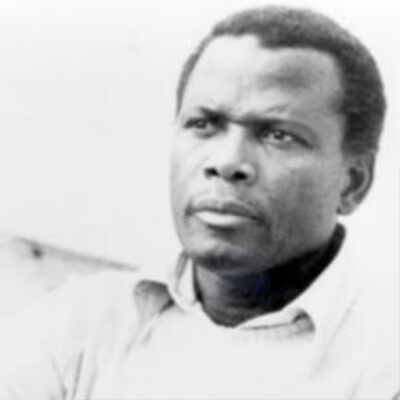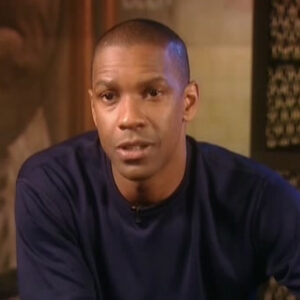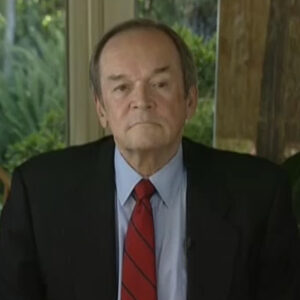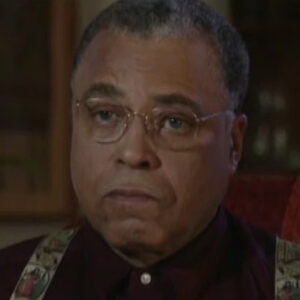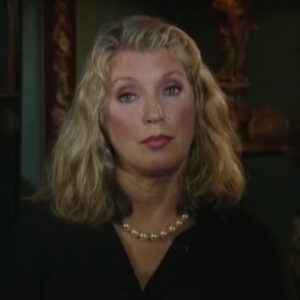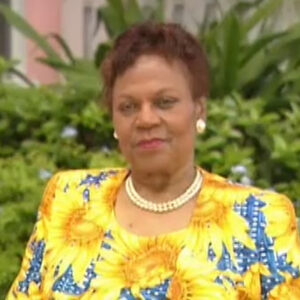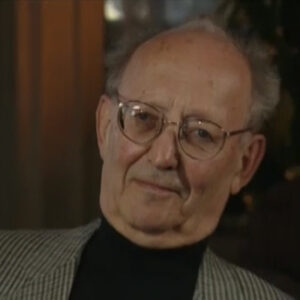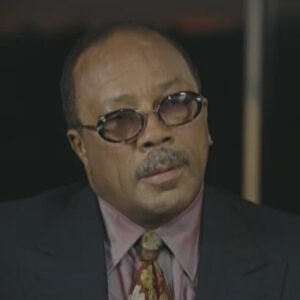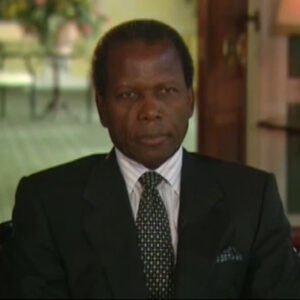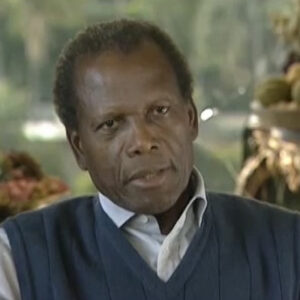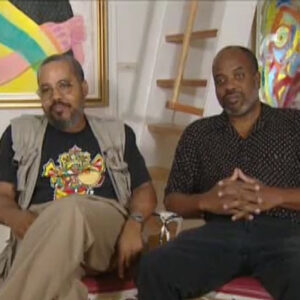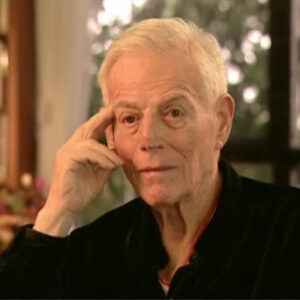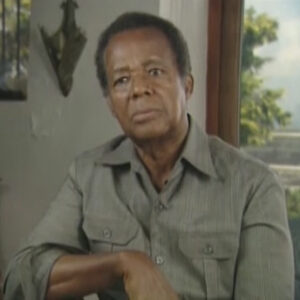Speaker Tell me tell me how you and Sydney met.
Speaker All right, I was a student at Northwestern University in Evanston, Illinois, which are just north of Chicago. And as a freshman, I had the great fortune of becoming a member of the national cast of the hit Broadway play with an all black cast, Anna Lucasta. So happens that kind of the lead recommended me to the director and I became a member of the cast. I stayed with them during my freshman year and then they left to go on the road.
Speaker I stayed in school when they came back the next year for a brief engagement. Of course, I went down to see the people that I knew in the cast and to meet the new people in the cast. I was particularly interested in meeting the person who had replaced me. He was a nice young man who smiled a lot and what he didn’t say very much, and very frankly, I was not at all impressed with him. But, you know, as a person, I was not not particularly impressed with him. And to my great astonishment, a few years later, I picked up the paper and found out that he was going to be starring in a movie called No Way Out.
Speaker His name was Sidney Poitier.
Speaker And that’s how we met. Oh, he replaced your part.
Speaker And he had the job that I had had the year before in Lucasta.
Speaker And so how did you become friends?
Speaker Well, we we met and I we didn’t see each other for a number of years. But when I came back into New York to live not long after, no way out, we renewed our our acquaintance and we worked together a couple of times. There was a subway circuit production of detective story. You know, of course, what subway circuit was in those days. Detective story. All right, fine. And someone came up with the beautiful idea of doing an all black cast production of detective story. Right.
Speaker So Sidney was starring in the cast and I was engaged as assistant stage manager and had a small role of a gentleman who had lost his silver and had come to the police station to have to report this on some backstage space was limited. I shared a dressing room with Sidney and another friend, an actor named Julian Mayfield. So the three of us pals around together, to some extent, during the three weeks that we were in the subway circuit production, we played a week at the Apollo in New York, a week at a theatre in Brooklyn that I don’t remember, and another week in Washington, DC. So we we worked together at that time. Over the years, we as both of us married, our families exchanged visits. And I went down to visit him on several occasions in Nassau and the Bahamas. And when he was in in Hollywood much of the time, I occasionally had a chance to go to the coast. I worked for Universal Studios for a brief period. And of course, we got together when we were out there as well. So over the years, we have continued this friendship, and particularly since he’s been back in the New York area. We have lunch together and talk on the phone and talk about all sorts of things in the girls and the girls that once were in particular.
Speaker And just last night, we were we were on the phone and reminiscing about some of the ladies that we had run across from time to time, including a couple who were in the cast of Anna Lucasta almost. Well, I forget to say how many years.
Speaker I hate to say how many years ago, but not only did he do your part, but he shared a couple of your ladies.
Speaker Well, I’m not sure we share the ladies, but we were we admired, let’s put it that way.
Speaker We admired some of the same ladies. Yes. We also came close to having a another business arrangement. At one point, I had written a play based upon a novel about Africa called A Wreath for You Domhnall and the Producer. We’re trying to raise money to do it on Broadway, and of course, he wanted Sidney Poitier to star in the production, but Sidney had signed to do Paris Blues and had gone to Paris. And when he came back, he had other things on his mind and unfortunately, we weren’t able to get him. So instead, what other things did he have on his mind?
Speaker Well, you have to ask Sidney that. But I can only speculate. I can tell. Well, I wouldn’t I wouldn’t rule it out, but I wouldn’t rule Diahann Carroll out or perhaps some of the ladies as well.
Speaker But anyway, we weren’t able to get him, so we took the production instead to to London. It was not a success, unfortunately. So when I came back, I had to reassess my priorities. Having invested five years in this enterprise and with a wife and a child to support, I had to decide on doing something other than writing for the theatre.
Speaker So you became a producer?
Speaker Well, I wrote for television and for film and produced for television and film. Tell me about a battle going on right after coming into New York and not too long after graduating from Northwestern University. I was pursuing a career as an actor, but there were very few parts available for black actors and actresses in those days.
Speaker And the parts that were available very often were stereotyped roles, which I refused to do, which meant, of course, that I hardly worked at all. And I began talking with some of my fellow actors and actresses about this and saying we have to turn down some of these roles and educate these producers and directors that this is passé. This Amos and Andy business is not the reality of the black experience in America. Well, some of them said, well, well, you’re single and young and I’ve got a family, wife and family. I have to take anything that comes along and were other excuses given. But I kept plugging away saying we have to take a stand on these things. So finally, someone said to me, well, Bill, since you feel so strongly about it and you know you’ve been fortunate enough to have a college education, why don’t you write something for us?
Speaker Well, I hadn’t thought about that, but I did. And I eventually settled on a newspaper clipping that I had pocketed and put it in my wallet and carried around for a couple of months about the presentation, the upcoming presentation to the mother of a black soldier killed in the Korean conflict.
Speaker They were sending a three star general from Washington to come down to present this medal at the segregated high school and in a small town in the South with a segregated audience, et cetera, et cetera. And I was struck by the ironies involved. And so one day I sat down at my little garret at the Harlem Way at one hundred and thirty Fifth Street. I didn’t have have a typewriter. I just had pencil and paper and began writing. And eventually I turned out a play called A Medal for Willy. Based upon those events, to my great astonishment, there was interest off Broadway in producing it. And eventually a group called the Committee for the Negro in the Arts undertake to produce a medal for Willie. It took them a while to raise the money, but eventually they were able to mount the production. Among the members of the group were Sidney Poitier and Harry Belafonte. The production opened and it just so happened that with the Korean conflict still on, I received a draft. I received my draft notice shortly before it opened. And lo and behold, I had to report for induction into the army the morning after the play opened. Some people have speculated as to whether or not this was pure coincidence because the matter Willy was a strongly anti-war anti-racism play. But I’m afraid it was it was just a coincidence.
Speaker You don’t think the State Department was after you?
Speaker They well, they might have a little later on, because what happened is that after spending two years in the army and coming back, I sought to resume.
Speaker An acting career in case there were any pirates around and someone sent me to see an agent and the agent reached up on the shelf and pulled down a loose leaf notebook and thumbed through and said, William Branch. William Branch. Oh, yes, I think we can we can handle you now. You’re off the blacklist. I said, I want to show you off the blacklist. I said, What blacklist?
Speaker She said, you didn’t know you were on a CBS blacklist for the past two years. I said for the past two years I’ve been in the army serving my country. She said, I don’t give a damn where you were. You were also on a CBS blacklist from a little all of that to this day.
Speaker I don’t know who put me on or why or who got me off or why, but I can only surmise that it had to do with a medal for Willie and the outspokenness that that that particular play exhibited at that time.
Speaker It was, as you know, during the McCarthy period and you weren’t supposed to say things at that time. And that ran counter to the official government position in terms of the Korean War.
Speaker Later on, there were protests concerning Vietnam, but there was very little outspoken protest concerning the Korean War, because if you spoke up, you were you you were blacklisted. You were you were deemed a pinko red, etc.. I was angry about what was happening primarily from a racial point of view, although I was also concerned about the the involvement of the United States in a war which I didn’t feel was justified. And the similarities which arose later in terms of the Vietnam War that were protested, it seems to me, justified the feeling that I had earlier. But again, coming.
Speaker Yes. Tell me, what did Sidney do as a support thing that they put in money? Did they try and raise money for a medal for Willie? Yes.
Speaker Yes. It took them a while to raise money. There were several jobs to do this. I’m sorry. What was he trying to say? No, no, no. The committee is a Negro on the arch. Now, Sidney was a member of the group and the group had several fundraisers, had several investor readings.
Speaker And he made any he hadn’t made a picture yet, had he?
Speaker Oh, yes, yes, yes.
Speaker Sidney was was way out at that time, had had made probably two or three pictures because this was several years after. No way out. Several years after. No way out. There was nineteen fifty one. And so Sidney had a couple of pictures under his belt. Yes. Well many and a few to do so. I don’t know for sure, but I would not be surprised if he had not invested a few a few of his dollars in in the production itself. He was there by the way on opening night. And when the curtain came down, the stage manager eventually quieted the audience and asked me to come up on stage and announced to the audience that I was leaving for induction into the army. The next morning. There was, of course, a gasp from the audience, and I just managed to stammer out a few words of thanks in terms of the coming and and dashed to the bar next door. A moment or two later, the door opened and Sidney came in and came over to me and said, I haven’t cried in years.
Speaker And the two of us sat there and had a drink and comforted each other. I say. So we established a bond that has endured for longer, I guess, than either one of us care to care to admit. But it’s been close to fifty years.
Speaker Where are your folks originally from?
Speaker My father was from South Carolina and my mother was from North Carolina and my father was an amazing minister in the African Methodist Episcopal Zion connection. And in in those early days, the ministers were moved around quite a bit so that as a result, our family lived in quite a few places. Every three or four years we moved and as kids there were seven of us, all boys. By the way, we look forward to moving and every three, every two or three years we are we’ve been here long enough time to get out of here. So we lived a number of places. My older brothers lived in places in the south where my father passed it. I was born in the north and the New Haven. And have lived most of my life in the north.
Speaker Were there parts for black actors when you came?
Speaker Were there were there were black actors working?
Speaker Well, that that that is is very germane in terms of of what steered me away from a career seeking a career as an actor into writing. I vigorously objected. As I said before, to the kinds of roles that were being offered in those early days and stereotypical roles, the maids, the butlers, etc.. There’s nothing wrong with being a maid or a butler, but there certainly is something wrong with being a maid and a butler all the time in terms of black actors and actresses when this certainly is not true. And and what was never true in terms of of everyday life or the reality of the black experience.
Speaker Do you think that that the kind of parts that Sidney played when he went into film broke open those stereotypes?
Speaker Absolutely, Sidney. The roles that Sidney was able to to to get in film were, in effect, revolutionary for their time. He was breaking new ground with role after role after role in the 80s in the early part of his movie career. Now, there was I mean, to be honest, there was some difference of opinion in terms of some of his fellow actors and actresses and and intellectuals who were not entirely pleased that the media in which the the roles in which Sidney was cast almost always had him as a black man in a white setting. In other words, it was very little reference to the black community or to the families of the characters he was playing or something of that sort of in the sun. Yes. A Raisin in the Sun, of course, was an entirely different than Lorraine Hansberry Broadway play that was filmed it. But many of the other roles, Village of the Feel, of course, being a prime example in which he was the only black person in the entire in the entire film. And there was no reference whatsoever representation of where he came from or his family at this time. The other. But then it was a matter of understanding. And some of us in in the business or close to the business did have an understanding of what kinds of pressures were being brought to bear at that time. The fact that that Sidney was able to keep working at all was a benefit to all of us, actually, in terms of breaking through and eventually establishing a pattern in terms of the fact that black actors and actresses could play roles of dignity rather than the comic shuffling Stepin Fetchit type of things that had been reserved for him, for black actors when there were roles at all in the past. So that it was a question of understanding and a question of perspective involved Sidney and on a number of occasions without great publicity, did turn down a number of roles that he was offered because he felt that they would be offensive. So I think actually that it’s a question of viewing things in perspective. And fortunately, there were some of us who understood what was happening in the film industry in particular at that time, and understood that it was unfortunately a question of gradual involvement in the mindset of the film community in terms of the kinds of roles that he progressively managed to obtain because people in the general public had no real understanding that that certainly didn’t write these these these movies and plays.
Speaker They were written by white screenwriters and produced by white directors and producers who had no direct knowledge of the black experience. And unfortunately, there were many who who refused to to educate themselves or to align themselves with people who did know about the black experience. And therefore. The things that that were offered to Sydney were not always what we would wish that they had been, but Sydney very often took material that was not the best. And by his his own dignity and presence and by suggestions that he made to the director and the producers during production was able to avoid some of the pitfalls and to elevate some of the roles that he had been offered. And I think he deserves a great deal of credit for that.
Speaker What do you think? Oh, why do you think Sydney became a star? What was it about him?
Speaker Well, it’s an interesting thing. As I said when I first met him, I wasn’t very impressed with him and I was astounded when I heard he was become a movie star.
Speaker I was going to star in the Hollywood film when I saw his production. However, I was absolutely entranced. He had very quickly become a first rate actor and I was delighted at his success.
Speaker It was just the acting, though. I don’t know.
Speaker It wasn’t just the acting. No, it wasn’t just the acting, Sydney.
Speaker It is one of the most remarkable people I have ever met.
Speaker He, as you know, began in very, very modest circumstances, had very little opportunity for a formal education. And yet, if you would talk to him today, you would think that he had at least a deep is self educated and well educated. And it was a question of his own involvement in terms of a person as a human being, as a concerned human being, in terms of the social and political setting in which he found himself, that he had evolved into a compelling human being both on and off the screen. And I’m sure that had a good deal to do with with his rise in Hollywood. Obviously, a good deal of credit also goes to his long time agent, Moneybomb, who was relentless in pressing for roles for Sydney and having roles written for Sydney and movies written for him, etc. But it certainly would not have worked if Sydney had had a different kind of personality.
Speaker There were other actors around, let’s face it, who some of them as equally, if not more talented than them, Sidney Poitier. But for one reason or another, they did not make the breakthrough.
Speaker Sidney did. Sidney did. Now, many have followed in his wake happily, particularly in recent years. And let’s talk about that.
Speaker I mean, it’s getting off to the beginning of Sydney, but let’s talk about that. What is the difference now? You know, would you want to be a young actor now, a young black actor starting out?
Speaker If if if the situation that exists today had existed 50 years ago when I was interested in being an actor, I would certainly pursue an acting career today. There is a far different mindset involved. It’s not it’s still not exactly what we would like, but it is a far different mindset involved. There are far more opportunities in terms of roles. There are African-Americans and Asian-Americans who are writing for the screen nowadays as well as white writers. There is a vast difference in the climate between the early 50s and today, and obviously the civil rights movement in particular must be credited with with having a very sharp and and irrefutable effect upon that. Now, as I say, there are other ways we still have not have not reached the millennium by any means. There is still a great deal of room for improvement and people are pressing for improvements. But the situation is is like between night and day as to what it was 50 years ago.
Speaker Um.
Speaker Was Sydney involved in the civil rights movement? Very, very much so, very often, quietly, but very often a question. Question? Yes, my question.
Speaker All right, so just repeat, former Sydney was certainly very much involved in the civil rights movement, very often quietly behind the scenes. It was a question of helping to raise money, of donating money and on many occasions of publicly lending his name and his presence from time to time. He, of course, was present at the famous March on Washington during which Martin Luther King gave his great I Have a Dream speech. Sydney has always been active politically ever since I’ve known him anyway and concerned as a social individual. You know, of course, that this did get him into trouble at various points in his career. And for a brief period, he was blacklisted. He could not work in Hollywood, and he opened a restaurant, ribs in the rough place on 7th Avenue in Harlem in order to feed his family. And I eat in ribs in the rough many a day. Eventually, he was able to resume his career and to carry on, but he did not diminish or change his political and social outlook. He has continued to insist that that he is not the noble, savage exception, that some white people have tried to push him into, that he is concerned socially and politically about all people, and particularly, of course, about African-Americans.
Speaker Now, he’s he is a Caribbean American.
Speaker That’s true in terms of birth. Yeah.
Speaker But in terms of upbringing, I repeat what I’ve said so far in Sydney, though, born a Caribbean American, certainly is an African-American in in every respect of the word, because he has lived most of his life, nearly all of his life in America, but not in the Caribbean.
Speaker He has roots, family roots in the Caribbean. And he has gone back and forth from time to time.
Speaker And, of course, is no the reason why the Caribbean Americans cannot claim him as well as African Americans. And they do.
Speaker But to call him strictly a Caribbean American would not be, I think, the truth. He certainly, in every sense of the word, is also an African-American.
Speaker Do you think I mean, having been to Nassau and you have and visited him there. Yes. That in a country that has a 90 percent black population. Yes. That there is a kind of self-esteem that comes from being raised in a place where you are surrounded with yourself.
Speaker Yes. In in not only in Nassau and not only in the Bahamas, but throughout the Caribbean.
Speaker There is a distinct advantage, psychologically, I believe, in terms of the descendants of Africans who were brought over and enslaved and made to work on the plantations, et cetera, because they did not have a predominantly white population. In other words, they were not a minority in a predominantly white situation, albeit the white minority were the plantation owners of slave owners, etc. There was a community that was able to be established among the slaves and the descendants of slaves, which retained a certain psychological and emotional advantage. I believe so that people coming to the United States today, for example, from the Caribbean very often have a certain sense of self and a sense of community that African-Americans have unfortunately had fractured in many ways, being a minority, largely a minority in a country in which the population does not predominantly look like them and have that background so that in. Terms of Sydney’s background, I’m sure some of that was a part of of of his growth, a part of the the dignity that he was able to espouse, not espouse, but to to exhibit. Let’s put it that way. In terms of his his is she’s bearing both on camera and off. This does not mean, of course, that many African-Americans have not been able to assume a positive self-image either. Many of them have, of course. Yes, by all means. Many of can have what it has been a matter of struggling against a certain adversity that Caribbean Americans. Well, I won’t say that they have not had to struggle against adversity. Adversity, obviously they have. But this particular kind of. Oh, yes, I was there on opening night of A Raisin in the Sun, and actually I had attended several rehearsals before they went on the road. I was very, very interested in the production of the author. Lorraine Hansberry was a friend of mine. Sidney was a friend of mine, and many members of the cast were friends of mine. Of course, eventually I became friends with the producer, Philip Rose as well. It was a a and exciting event in the theatre, exciting event in American culture, actually, in terms of the production of A Raisin in the Sun, it it spoke to the heart of the black American experience in America. And it did so again with a with a dignity, with an honesty and a forthrightness that had not, in effect, been allowed on the Broadway stage prior to that. Doesn’t mean now that there were not other writers who had written similar kinds of plays or kinds of material before then, but they were able to get them produced on Broadway. Alex Childress, for example, comes to mind in terms of some of her work and a number of others. Theatre ward in those days and several others had written wonderful material. But Broadway producers and directors deemed it uncommercial to do plays, serious plays having to do with with black American life. And therefore, it took a producer who was not a a regular Broadway producer. It took someone who became a Broadway producer, Philip Rose, who was involved in the music industry and song publishing, et cetera, to become a producer in order to produce that particular play. And of course, he, too, had difficulty getting it on Broadway, that he took it out on the road and it was well received on the road. But they still didn’t have a Broadway theater and had to keep it on the road for several months before finally they were able to get someone to take a chance and give them a Broadway theater. And the rest, of course, is history. What was his performance like? It was magnetic and opening night. It had a special spice to it. And having seen the play before and having read the script before and having watched the production grow, it was marvellous to see it all come together on opening night. The performances by Diana Sands, by Claudia McNeil, the mother, all of them, it it tingled with excitement. It was a joyous, joyous experience at the theatre.
Speaker Joyous, joyous part of the thing that that I was talking about, about the Caribbean American, too, because there there is a sense of joy. Also, we are from a Caribbean Caribbean Americans who have not had a heel on their neck.
Speaker Well, they have had a heel on their neck, but it differs a high heel. Well, it differs in many respects from the from the African-American experience.
Speaker Again, there was a certain comfort in the fact that there were a majority to some extent and therefore had.
Speaker Limited direct dealings with a with a white minority that was not generally true here in the United States. The fact that he along inequities, was ever present and and direct here in the United States and determined to thoroughly emasculate the the African-American population in order to keep them under control so that there are differences between the two experiences.
Speaker But it would not be correct to say that that the Caribbean Americans did not experience dire hardships as well as African-Americans.
Speaker After the height of Sydney’s career in 1968, with to searing love and the heat of the night and guess who’s coming to dinner, there were criticisms, including a very vicious Clifford Mason article in The New York Times.
Speaker Where was all this coming from and and why do you think it was?
Speaker Well, there are some people who think that that article was by Clifford mentioned in The New York Times was unwarranted or overly harsh or even vicious. But to be too big to be to be essentially honest about the situation, that article did give voice to a number of points of view that I and others had heard expressed by people in the African-American community, by some other actors and actresses and intellectuals as well.
Speaker There was concern over the fact that the way in which Sydney’s career was being guided made him a notable exception in and in an otherwise all white area, and that there was no essential addressing of the realities of the average African-American experience and nearly all of these films. He was an exceptional person who was positioned in terms of of white America, which, as I say, was an advance over what have taken place in the past and was breaking new ground very often.
Speaker But it still was not a question of dealing with the realities of the black experience, such as in A Raisin in the Sun, for example. That was obviously a different kind of situation for most of the movies that Sidney was in during this period. Therefore, there had been some criticism as expressed concerning this. Now, some of the criticisms were expressed by people who did not understand the business and did not realise that Sidney didn’t write these these movies, that these movies were arranged by by Hollywood, which had very little knowledge and understanding of the African-American experience, and to some extent were producing a commercial package with Sidney in it. And that at least in the early days, they were they were taking the chance and doing that because there was no guarantee that a white audience was going to respond. When they found that the white white audience would respond to Sidney, then it was a question of creating the kinds of packages that they could sell to a predominantly white movie audience. And therefore, the roles in which he was involved almost always related more to the white community than to the black community. So that there was legitimate criticism, I think, of that kind of media, the criticism of Sidney himself on a personal basis, I thought was unwarranted.
Speaker But the criticism of the kinds of roles that were being created by white forcedly certainly could and were questioned by by numbers of people in the African-American community.
Speaker Did you think that that also apply to in the heat of the night, which I saw recently? I don’t know whether you did, Bill, because, I mean, it was a black cop going down into a segregated South in which he was up against almost the same kind of treatment as blacks in the South were.
Speaker Well, again, nothing in terms of any of these movies is a question of Nirvana. And none of them have reached the ultimate even today in that respect. And for each time in the heat of the night, guess who’s who’s coming to dinner to sir with love. These movies were advances over what had taken place before, despite the fact that there was still room for criticism of the way in which these.
Speaker Movies have been created.
Speaker It so happened that those three movies in particular were all produced within the same year and elevated Sydney to the top of the box office for that year, the first time ever that a black actor had become the top box office movie draw in the United States of America. It was amazing in that regard. And as I say, it was a matter of a startling advance in perspective, in perspective.
Speaker This does not mean, though, that there was still not room for pressing for a a more realistic and a more equitable outlook and and and forthcoming from Hollywood itself in terms of of creating roles that that had more to do with reality in terms of the black American experience than these contrived kinds of situations that white screenwriters were creating, along with, of course, the producers who were producing.
Speaker What?
Speaker Why do you think that Sydney went into directing in terms of of actors, particularly those who have been able to establish careers in Hollywood?
Speaker I think it is. It is. And it is almost inevitable that they are interested eventually in directing and maybe also even in producing. Acting is something in which to some extent, you you perform as a as a trained creature, perhaps creatures to harsh a word to use. But you, in effect, are carrying out the wishes of someone else.
Speaker And eventually, of course, actors have attitudes themselves as to whether or not the directions that are being given to them are to their liking or whether or not they feel they are correct. And they themselves therefore want to to be the position to be in the position that just last week to this show.
Speaker You need to stop your train of thought, OK?
Speaker And certainly Sydney was no exception.
Speaker He certainly was interested in becoming a director and a producer, and he became both during his career after his first directorial piece, as I recall, was the the Western. I know it. And all of a sudden I get a bit of a book in the freezer.
Speaker Oh, yes. Yes. All right. Let me start again. His first directorial assignment, of course, is his debut as a director of it was with the buck and the preacher in which he took over from a another director for some reason or other. I don’t know why, but he took over and did a marvelous job with that film. In recent years, I have been a professor of theatre, dramatic literature and communications at a number of universities, including the University of Maryland and for nearly 10 years at Cornell.
Speaker And in terms of the communications courses that I taught, we every year made a feature of showing Buck and the pressure. And it was always very, very well-received by both black and white students who had not had a chance to see it beforehand and in many cases were amazed that movies of this quality had been done some years before. And when I pointed out that Sidney not only starred in the movie but also directed the movie, it was a surprise to too many of the students that that were in the courses.
Speaker Yeah, and stir crazy. Oh, yes. Stir crazy. This is an amazing such a, you know, a wild, funny family today.
Speaker I mean, with all the nutty things that are being done, you know, great comics today.
Speaker I mean, what else am I didn’t know that Sidney had that kind of humor.
Speaker Well, apparently, as I understand it, he had been trying for years to get Hollywood to see him as a humorous, not a comedian, but as a humorous as well as his dramatic roles. And for some reason or other, they they they preferred to play it safe and continue to make money in the established mould.
Speaker But he had it’s what he eventually had a chance to do it for himself when he was able to arrange, I believe, a three picture deal with Columbia in which he was able to develop and produce a number of films of his own show that he produced three comedies in a row uptown Saturday night, Let’s Do It Again. And I forget the name of the third in which he he brought in Bill Cosby and Harry Belafonte.
Speaker And they had a marvelous time being humorists in these films. And Sidney had a chance to do roles that Hollywood had not offered him before, and he was able to create something that he wanted to do so that hang out with his friends. And that’s true to had a very good time going back to the book.
Speaker And the preacher, that film in particular was a joy in the ruby. Dean was also involved, along with Harry Belafonte and Sidney Poitier. So the three of them in this film with roles of dignity, occasional humor, but in roles which were based upon historical reality in that in that respect, it was a marvelous film and a marvelous advance, it seems to me, in terms of the film industry and certainly in terms of doing pieces having to do with the the history and the reality of the black experience in America.
Speaker Do you think that and I’ve heard from younger actors today, the Denzil’s and the Robert Townsends, that being 12 and 13 years old and sitting in whatever small town you come from and going to the movies which, you know, all kids do and seeing Sidney up there was the kind of incentive that they feel it was to say, well, now I see I can go into the business, too.
Speaker Yes. The the example which in effect suddenly became the role model that eventually became to others who. As children, as teenagers, perhaps saw him on screen and said, gee, I’d like to do that too, and were conscious of the fact that a black man was able to do these kinds of things, certainly had, I think, a signal influence in terms of the careers of many of the actors and actresses who have followed, certainly in terms of Denzel Washington and many others. Ossie Davis in his new joint biography with Ruby Dean. Also mentioned is the fact that the trailblazing that Sidney did was beneficial to too many actors and actresses because it opened doors and it showed possibilities and it gave hope to younger people that they, too, could enter a field which in their wildest expectations beforehand would have been close to the.
Speaker Up there, there came a period, I don’t know who put it this way, I think it was his his nephews in the 60s with the Black Panthers movement and things like that, where city was kind of relegated to the kind of position that they put Martin Luther King in at that time, which is that they were like people of the past, not revolutionaries, not you know, I’ll talk about that.
Speaker For me, it seems inevitable that people who do make advances eventually are viewed by their successors, you might say, or younger people coming along who have been able to espouse a higher degree or higher level, you might say, of of militants vocally, at least, if not in other ways, sometimes then fine people who had made these advances possible to be passé or in some ways less less valid than themselves. And that certainly applied to people who at one time considered Martin Luther King irrelevant and had extended as well into the entertainment industry in terms of even a pioneer such as Sidney Poitier. But again, it’s a question of understanding, of being aware and understanding what went on before. What takes place today does not take place in a vacuum there. There are innumerable. Factors which have contributed to whatever the situation is today, and very often young people have not had the grounding in history in the past that they need in order to be able to see things in to perspective in that regard. And I think that is what happened for a time during a period with the Black Panthers and others who were espousing militancy, who condemned anyone who was not in their circle, and saying what they said as being behind the times or passé or what have you. Happily, I think much of this has been outlived by figures such as Martin Luther King and even by by Sidney Poitier as well. He has continued to with his career and he has continued with new and different roles. He was able now to pick and choose, and he wasn’t in the early days, of course, he was able now occasionally to generate his own productions and hire his own writers, things of that sort. That was not true during the period when some of this criticism was arising.
Speaker So it’s a matter, again, of understanding the business, of understanding history and of generating the kind of perspective that puts these things in place. It’s very, very easy to from the outside just to to look on something and say, I don’t want to see all that. I’m interested in what’s happening now. But it is important to understand what went on before now. Otherwise, what’s happening now has no real meaning, no real validity. You cannot just espouse what is today.
Speaker You must understand what went on before in order for today to propel us into a a more positive tomorrow. And that, I think, is something that it takes time for young people very often to learn that I can look back on my own career with being impatient from time to time with with my elders. And later on, there was a certain understanding, a certain perspective involved when I was able to to learn what had happened and what what went along the way, etc., to to view someone as passé, as passive or something of that sort without understanding it can be very, very cruel.
Speaker And certainly that has happened to a number of people, including Martin Luther King and Sidney Poitier from time to time.
Speaker That’s that past, I think the militancy period. I think I can get with that kind of militancy anyway.
Speaker Yes, because there is there is still militancy. There is still militancy.
Speaker But it’s a question of of of a balance in terms of understanding where we came from before. We can realistically and effectively press toward where we want to go. And it sometimes takes people a while to achieve that level of understanding.
Speaker Um, would you say that Sydney is exploring a spiritual aspect of himself, Mr.
Speaker When it comes to matters of spirituality, we’re in such a gray area that I hesitate to to to to to comment. It’s also a highly personal area and one in which anything I would say might easily be misinterpreted. So I hope you don’t mind if if if I pass on that particular question, if you don’t want. Is there anything else?
Speaker No, that’s fine. Go to.

